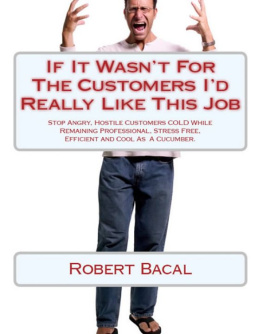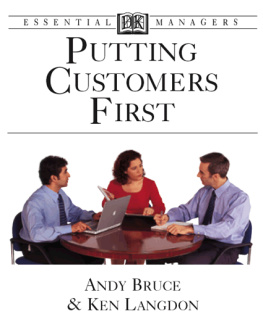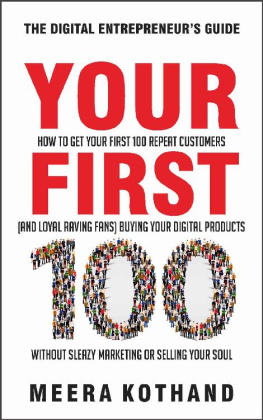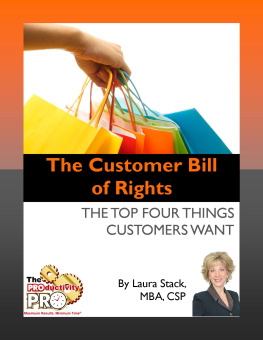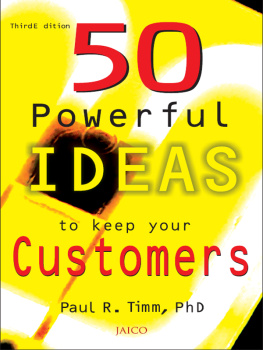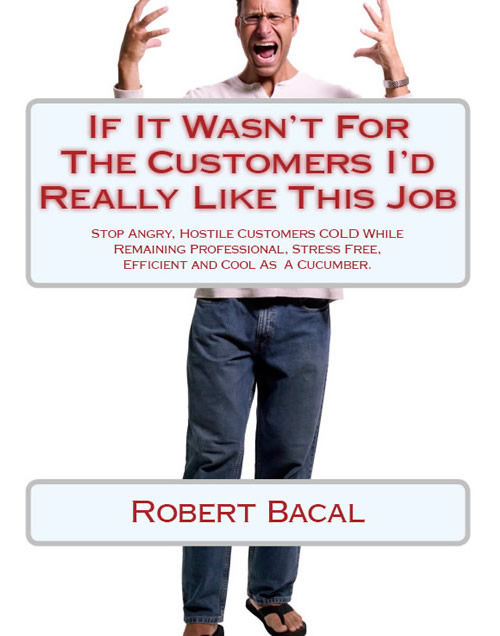
If It WasntFor The Customers, Id Really Like This Job
Stop Angry,Hostile Customers COLD While Remaining Professional, Stress Free,Efficient, and Cool As Cucumber.
By
Robert Bacal,M.A.
BACAL &ASSOCIATES
722 St. IsidoreRd.
Casselman,Ontario, Canada, K0A 1M0
(613)764-0241
This book isavailable in printed form from your local bookstore and online.
All rightsreserved, including the right of reproduction in whole or in part.C opyright Robert Bacal, 2011
SmashwordsEdition
Disclaimer:
While this bookis intended to provide accurate and authoritative informationregarding dealing with angry and difficult customers, it is soldwith the understanding that neither the author or publisher isoffering a professional service via this book. It you requireprofessional advice on topics related to this book or thesituations therein, please consult a qualified professional (e.g.psychologist, lawyer, law enforcement, security expert).
Table of Content
VI Starting OffSuccessfully
XVIII SpecialTopics
It just doesnt matter where you areemployed, or the type of business. If you work in a library, or ashoe store, or a lawyers office, you have met the customer youcant get out of your head. Work in the hospitality industry hotels and restaurants? There they are. He, or she, since genderhas nothing to do with politeness, is the person who is soannoying, rude, unreasonable, demeaning, impatient, and eventhreatening, that its hard to get the person out of your head evenafter the encounter is long finished.
You wonder. What should have I said? Or,you berate yourself for not not standing up for yourself or beingtoo slow to deliver the killing verbal insult that would put theoffensive person in his or her place. You m ight even rant and rave about the personon the way home from work, and at the dinner table. Even worse,when the lights go out for the day, and you should be slipping intopeaceful slumber, you lie there thinking about how unfair orvicious the customer was. Ouch.
Youve rented space in your head, to a personwho is going to make holes in the walls, and renege on the monthlyrent. This head renting freeloader is never going to pay yourstress bill.
You can legitimately say: If it wasnt forthe customers, Id really like my job. Which, not coincidentally isthe title of this book.
This book will help you deal with thesecustomers in a constructive and helpful way that will benefit youin the following ways, provided you use the techniques consistentlyand properly.
You will:
Shorten thelength of time you have to spend with angry, hostile and abusivecustomers, whether they are in the right or in the wrong. You savetime.
Reduce theintensity of the customers anger so that they are less likely totarget you, insult you, or even attack you physically and at thesame time, you will come across as helpful.
Feel confidentthat you can and will control difficult customer interactions andreduce the feelings of confusion (not knowing what to do), andhelplessness.
Convey theimpression to your boss and colleagues that you are really good atwhat you do and in, particular, at keeping your cool in toughcircumstances. That means, you are more promotable.
Enjoy thesatisfaction of helping people who start out angry, and end uphappy you have been able to help them the satisfaction of havingdone an excellent job.
Stop bringingnasty customers home with you (your spouse will be so pleased), andensure they dont sneak into your bed at night (well, thoughtwise). Learn to put it away when it is time to put it away. Reducethe stress.
Surveying TheCustomer Service Landscape
So, what is happening out there in customerservice land? Have people become more aggressive and nasty over theyears? Are they more demanding than they used to be? Maybeemployees such as yourself have experienced attitude shifts? Wheredoes management fit in? Lets take a look at the landscape in whichyou work. Lets consider the three main players Employers,customers, and employees.
Lip Service ToCustomer Service + Lack of Investment = Frustrated Customers
No doubt youveheard the litany repeated over and over again. Its all aboutcustomer service. You have to amaze the customer. You need to befaster than a speeding bullet. Go above and beyond the call ofduty. Youve heard many of the slogans trucked out by managers andexecutives, pundits and consultants.
In a sense theyare right. In a world where its hard to compete on price, theservice offered to the customer becomes a critical aspect ofwhether the customer returns, or at least, so it would seem.
The problem isthat while companies push their employees to be better and betterthrough exhortations, they usually look at customer service as anoverhead COST, rather than an investment. When budget decisions aremade, what happens?
In retail,companies reduce the number of people on the floor so when it getsbusy, its impossible for floor staff to do their jobs and servecustomers quickly. Stores get messy, items are mispriced or lackingprices.
In terms ofcustomer support, companies replace personal service with automatedservice (such as call centers, use of social media, etc), with theoutcome that customers end up having to wait longer to be served ifthey need help or have a problem.
The people whohave the power and authority (supervisors, managers) to helpcustomers and solve problems are often, themselves overworked, soit can take some time for them to respond to a customers phonemessage or email. The underlings are not allowed to makedecisions beyond basic workaday fixes. Its not uncommon foremployees who need authorization from a manager to not be able tofind one quickly.
The outcome isobvious. Customers end up more frustrated and ready to jump downthe throats of anyone working for the company. Worse yet, mostcompanies act in this manner so the customer feels trapped.Psychologically that is never good. Frustrated, trapped people tendto be much more aggressive.
The otheroutcome is that employees get frustrated too, since they are oftenasked to do things that are nigh near impossible when the customerflow increases past a particular level. That means employees aremore volatile and impatient too.
OverblownUnreasonable Customer Desires Fed by Companies + Low Expectations =Hair Trigger Customer Behavior
One thing thathas changed over the years is that customers want more fromcompanies. For example, twenty five years ago it would be unheardof (and laughable) if a customer tried to return something to aGumbys Hardware Store when the item was purchased at the GoGoMart.If you didnt have the receipt, youd be told to go pound sand,perhaps politely, perhaps not so politely.
Nowadayscustomers try this fairly often, because theyve been taught by thecompanies and corporations that if you whine and complain longenough and loud enough, you can get away with things like this.
While companiesbalk at investing in more staff and training them to be better attheir jobs, they have become more lax about the one off kinds ofexceptions customers ask for. Hence, customers have completelyunreasonable desires, and corporations have fed them. While not theonly reason for inflated customer wants, its a powerful one.
Thats not thewhole story. While they want more, customers also expect the worstwhen they shop. They are primed to be angry because while they wantto be treated like kings and queens, they know that for manythings, its not going to happen. Things will go wrong. This isoften accurate, since shopping has become more and more difficultand annoying for many people, as they face the results of staffcutbacks. Incorrectly priced items, no prices, long lineups, itemsout of stock, failure to return calls promptly are the norm. We allexperience them on a daily basis.
Next page
